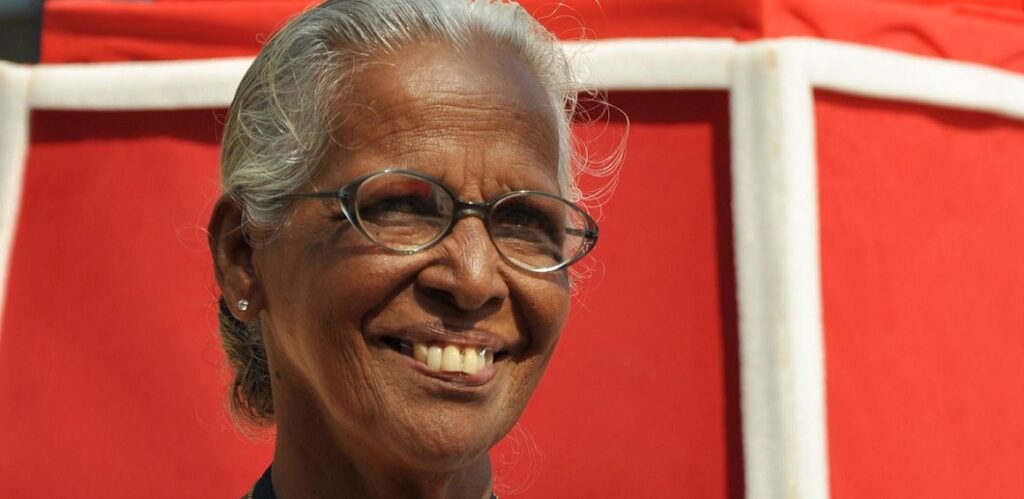As Kerala celebrates its 65th foundation day, a look at the octogenarian theatre activist, PK Medini. Her songs calling for an egalitarian society have a renewed listenership.
In the early 1940s, PK Medini used to sing with reverence a song that hailed the king who ruled her region under Travancore. That was as a fourth-standard student practising for the anniversary show at her primary school in coastal Alappuzha. Vanchibhoomi pathe, as the opening lines go, extolled the virtues of Chithira Thirunal, who was the last Maharaja of the princely state.
The king, whose official name was Balarama Varma, died in 1991, four decades after the dissolution of his province. Travancore ceased to exist in 1949, meanwhile, when it was merged with the adjacent Kochi on July 1 that year. Thiru-Kochi, as the entity was called, withered in 1956. Kerala state was formed along the southwestern coast of a nascent India.
Today, November 1, is the Kerala formation day. As the state enters its six-and-a-half decades of existence, Medini is 87 years old.
The pre-teen girl, who sang in praise of her king, went on to become a popular musician. Ironically, Medini’s heyday numbers reverberated with a spirit against the feudal culture that prevailed in Kerala. In the 1950s and ’60s, her close association with KPAC lent added vigour to the theatre movement steeped in communist ideology.
That said, Medini least regrets having sung the ditty lauding a provincial chieftain. “It was just an innocent expression of gratitude towards our lord. He was once among the 600 who ruled various parts of our country that time,” she recalls. Vanchibhoomi pathe,was set to a tune with plain notes that sound close to major Carnatic raga Sankarabharanam.
Within years after her penury-riddled school days , Medini was to deliver revolutionary songs at much bigger public gatherings. She sang at the stage presentations of the pro-Left KPAC (Kerala People’s Art Club) established in 1951.
Hit songs
Cut to 2006. Malayalam cinema that year got Nottam. The film portrayed the travails of a family with artistes who are into Koodiyattam, the ancient Sanskrit theatre (and the only surviving one of its kind in the world).
The movie failed in box office. But Nottam featured a song that had a great following. Paccha Panamthathe essayed a sequence that had all the usual trivia around the typical romance between a young man and a woman. It displeased cultural activists associated with the Left movement in Kerala. For, the lyrics were a direct lift from a song that used to reverberate at the meetings of the Communist Party and its trade unions back in the middle years of the last century.
Indeed, the ditty was sung mostly by Medini, who began to be fondly called ‘Paccha Panamthatha’ (green parakeet). Musicologist-vocalist Sumangala Damodaran recalls how much songs of this genre reached out to the masses as a cultural means.
“Medini’s singing was advertised through handbills. It announced that she would be singing with a microphone, a new acquisition by the union,” Sumangala writes in her 2017 book, The Radical Impulse: Music in the Tradition of Indian People’s Theatre Association. Music performances were “part of the mobilization”the author adds.
So enamoured was Sumangala of the song that the Delhi-based Malayali (a granddaughter of late Marxist ideologue E M S Namboodiripad) went on to learn Paccha Panamthathe. Soon, she began to render it herself at concerts. The song “explodes all stereotypes of the protest song”, the researcher says about the song sticking to a “light-footed waltz form”.
Encore Again
The last decade also saw the comeback of a revolutionary song. This time bearing all the classical characteristics associated with it. Meanwhile, Medini, since her 80th birthday in 2013, began to get frequent invitations to sing Red Salute, Red Salute Red Salute, Rakthasakshi gramangale.
The second half of the above lines refers to two villages in the vicinity of Medini’s native Cheeranchira. In 1946, Punnapra and Vayalar saw a communist uprising, claiming the lives of 620 workers of the party. The October-end revolt was against a move by the Travancore Divan to make the kingdom an independent country by not joining the Indian union.
Medini, notwithstanding her advancing age, sings Red Salute by bringing out its literary power. And, yes, the core shades of Hindustani raga Yaman.

